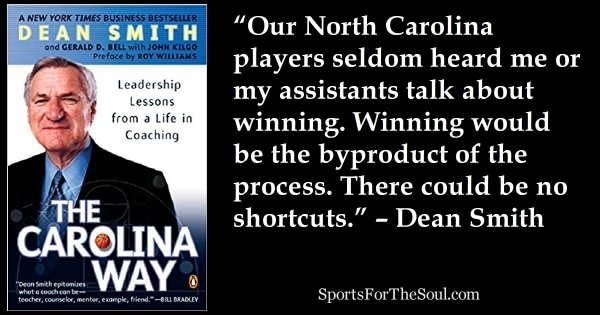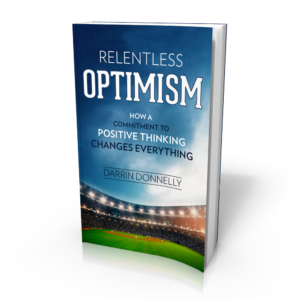 The more I study successful coaches, the more I recognize the one common philosophy shared by so many of history’s greatest winners: they made a conscious effort to NOT talk about winning.
The more I study successful coaches, the more I recognize the one common philosophy shared by so many of history’s greatest winners: they made a conscious effort to NOT talk about winning.
From John Wooden to Nick Saban, these great coaches concluded that because their players couldn’t always control the final score, talking too much about winning and losing could have a negative effect on their team’s performance.
Instead, these coaches recognized that their players could always control things like effort, attitude, discipline, and focus.
By focusing only on the things one can control, success naturally follow.
Dean Smith, North Carolina’s legendary basketball coach, is another leader who racked up the wins while promoting this success philosophy…
Although we didn’t have a system at North Carolina, we certainly had a philosophy. It was our mission statement, our strategic plan, our entire approach in a nutshell: Play hard, play smart, play together.
Hard meant with effort, determination, and courage; together meant unselfishly, trusting your teammates, and doing everything possible not to let them down; smart meant with good execution and poise, treating each possession as if it were the only one in the game.
That was our philosophy; we believed that if we kept our focus on those tenets, success would follow. Our North Carolina players seldom heard me or my assistants talk about winning. Winning would be the byproduct of the process. There could be no shortcuts.
Making winning the ultimate goal usually isn’t good teaching.
Tom Osborne, the great former football coach at the University of Nebraska, said that making winning the goal can actually get in the way of winning. I agree. So many things happened in games that were beyond our control: the talent and experience of the teams, bad calls by officials, injuries, bad luck.
By sticking to our philosophy, we asked realistic things from our players. A player could play hard. He could play unselfishly and do things to help his teammates succeed. He could play intelligently if we did the job in practice as coaches. We measured our success by how we did in those areas.
When we put these elements together, the players had fun, one of my goals as their coach. I wanted our players to enjoy the experience of playing basketball for North Carolina. Each player on our team knew he was important. Each did a terrific job of sharing the ball, which also made the game enjoyable for more players. All won and lost as a team.
– Dean Smith, from his book The Carolina Way
Focusing on the process instead of the final result, which is often outside of one’s control, is good advice for all areas of life.
A business owner can’t always control the success of a particular product, but he can control how much time and effort he puts into making that product great, marketing that product wisely, and listening to his customer’s changing needs and interests.
The stock trader can’t control what a particular stock does, but he can control how he responds to what it does by being disciplined with his buy and sell orders.
The salesman can’t always control whether he makes the sale or not, but he can control how many sales calls he makes and how well prepared he is for each of those calls.
The author can’t always control how many books he sells, but he can control how disciplined he is with his daily writing routine and how much effort he puts in to studying his craft and marketing his books.
It’s an ironic truth about winning. When we focus too much on the final results, which we don’t always have control over, we tend to overlook the things that matter most to our success.
However, when we focus on the things we do have total control over, we tend to experience the final results we desire.






